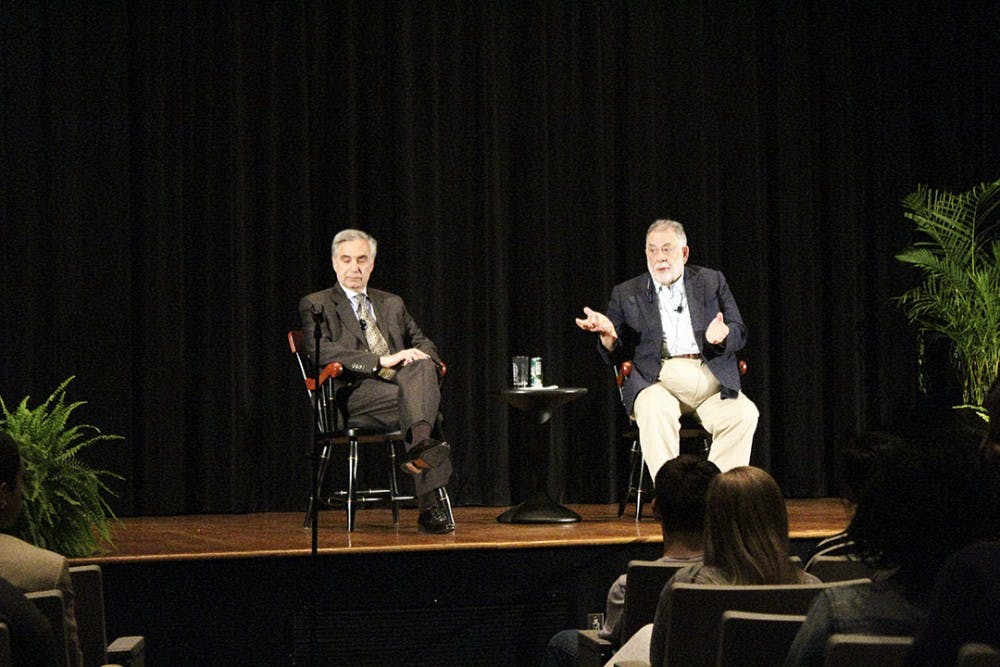Renowned director, screenwriter and producer Francis Ford Coppola was the key speaker at the annual President’s Leadership Dialogue with President Pastides. An hour before the event was scheduled to begin, many eager students queued outside the Russell House theatre.
Coppola needs no introduction, but for those unfamiliar with his work, Coppola directed modern cinema classics like “The Godfather,” “Apocalypse Now” and “The Conversation.” He has accepted six Academy Awards, four Golden Globes and a myriad of other notable awards and achievements. He is often regarded as one of the most influential modern filmmakers of this generation.
Coppola gave a 30-minute introduction describing the idea, creation and execution of his vision for the future of film, what he coined “live cinema.” According to Coppola, live cinema should be a marriage between live cable television productions and the storytelling elements used in traditional cinema.
Coppola is no stranger to experimentation with different types of media. Earlier this year, he announced his plans to transform “Apocalypse Now” into a videogame. Regarding the creation of live cinema, Coppola candidly admitted that he was unsure of how to approach the subject. He addressed students who felt like they didn’t know what they were doing and offered his response: “You’re in good company.”
To test ideas and techniques used to make live cinema, Coppola created workshops at UCLA and at Oklahoma Community College. These workshops resulted in the live cinema film “Distant Vision,” which was screened at the event. For this project, Coppola repurposed equipment traditionally invented for live sporting events in order to aid the creation of live cinema and storytelling.
“Distant Vision” was originally filmed, edited and streamed completely live. Coppola collaborated with students and faculty over a 27-day period and used over 40 different cameras to create a film that paralleled Coppola’s own personal experiences. In his introduction, he explained that as a child he would often play with cardboard television sets — the same memory that was used in the opening scene of “Distant Vision.”
In addition, he noted the benefits of collaboration with other creators. “Collaboration is the sex of creativity. No one likes that quote. But it's sort of true. You can work with your colleagues and dream up a project and get excited together and throw ideas back and forth, that’s the thrill,” Coppola said.
The film featured overarching themes of family, creativity and perseverance. Coppola would occasionally interject and add commentary during the screening. He mentioned that when the performance was originally screened it featured short commercial breaks because the actors and producers needed time to reposition. “We needed this break to run around every second,” Coppola said.
After the conclusion of the screening, Coppola had a brief discussion with President Pastides, but it was clear that the focus of the event was on answering student questions. Student Body President Ross Lordo monitored questions so that students could ask Coppola about his inspiration, technicalities of live cinema and winemaking, amongst other things. One student even asked for personal advice on screenwriting strategies.
Ryan Town, a first-year business student, sat on the front row and brought along his copy of “The Godfather” script with hopes of having it signed by Coppola himself.
“He makes an imperfect film that ends up being perfect. People appreciate the imperfections in something that's just so great. He is just so genuine and honest,” Town said.
Most of the event attendees agreed with this sentiment. Third-year journalism student Rachel Pittman commented on his effective cinematography that still made his work relatable to audiences.
Coppola provided lots of advice to the aspiring filmmakers in the audience. He discussed the process of finding inspiration from others.
“You have other people that you admire. It’s good for young people to rip off the older artists that you admire because you can’t. In other words, if you try to make a film like whomever it is you admire, you’ll be making your film, really. And that’s a really a good way of discovery,” Coppola said.
He addressed a question that many posed to him regarding his vision of live cinema. By filming a performance live, he consequently forfeits the directorial power to edit and modify scenes at will. But Coppola repeatedly emphasized the importance of live performance, which has existed for hundreds of years. He also discussed the value of improvisation and how it can often add depth to a scene. He mentioned the possibility of removing props from a scene in future workshops and allowing the actors to manipulate the situation.
“There can’t be beautiful art without risk,” Coppola said.

